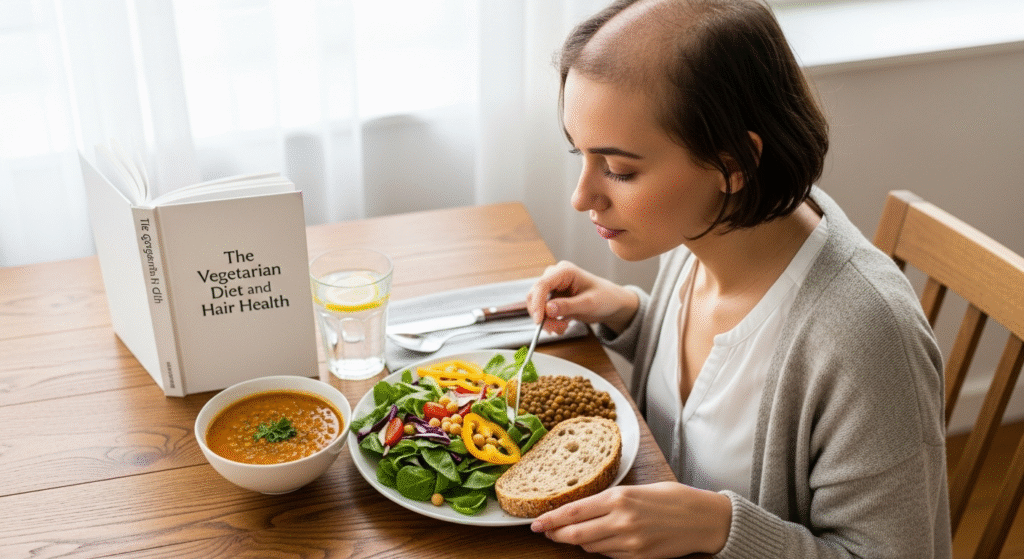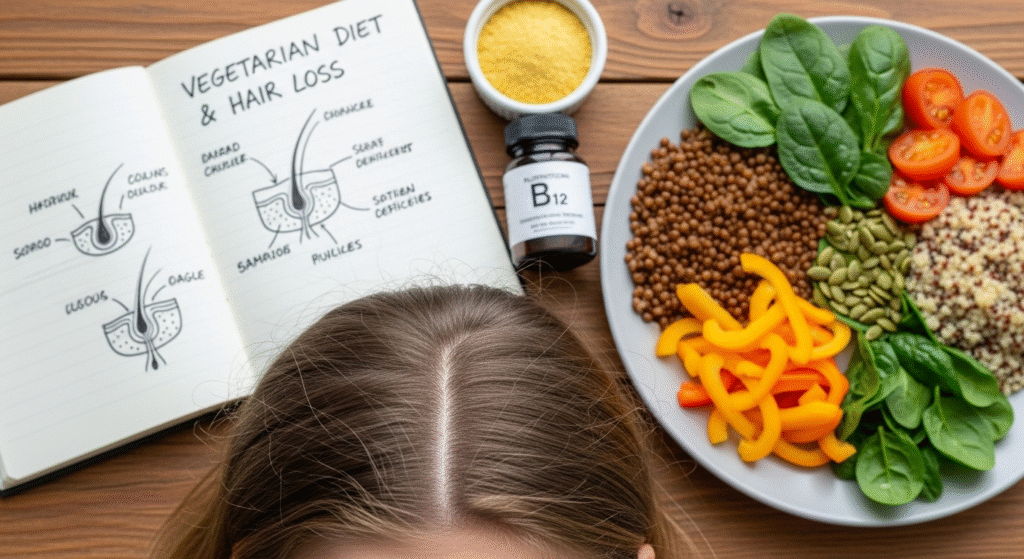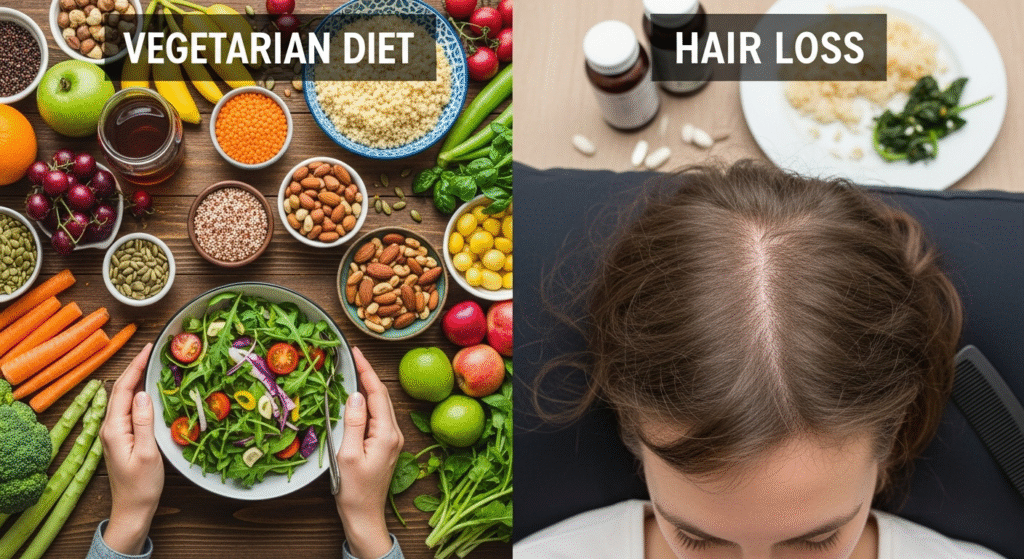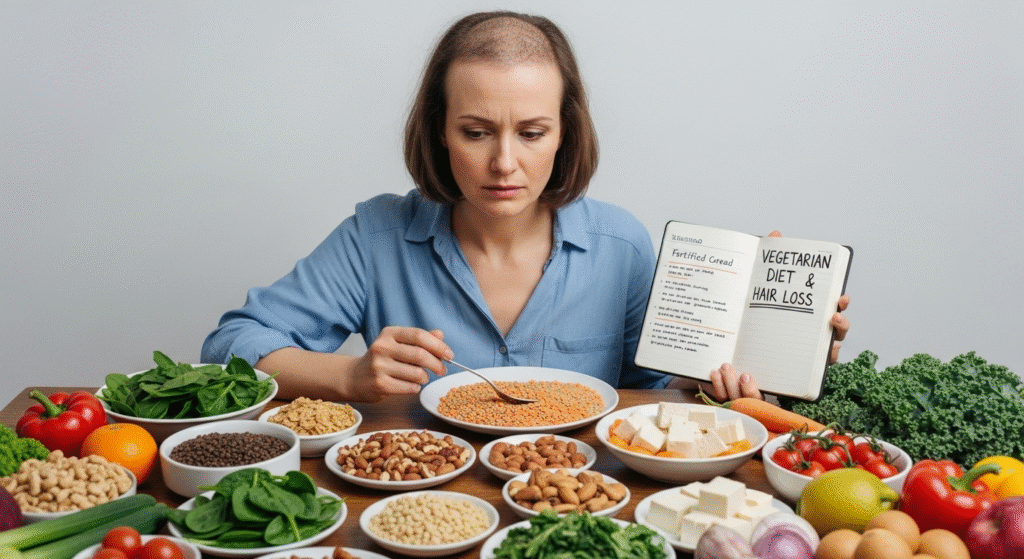Experiencing Vegetarian Diet and Hair Loss? It’s a common concern for many individuals who embrace plant-based eating but notice hair thinning or shedding. In this article, we’ll explore how a vegetarian diet might contribute to hair loss, the essential nutrients your body needs for healthy hair, and practical solutions to prevent hair thinning. By understanding …
Experiencing Vegetarian Diet and Hair Loss? It’s a common concern for many individuals who embrace plant-based eating but notice hair thinning or shedding. In this article, we’ll explore how a vegetarian diet might contribute to hair loss, the essential nutrients your body needs for healthy hair, and practical solutions to prevent hair thinning.
By understanding nutrient deficiencies and adjusting your diet accordingly, you can support your hair health and reverse the effects of hair loss.

Understanding the Link Between Vegetarian Diet and Hair Loss
Adopting a vegetarian diet can have numerous health benefits, but it can also pose challenges for certain nutrients vital to maintaining hair health. Vegetarians may be at risk of nutrient deficiencies, which are often linked to hair loss or thinning.
While plant-based diets are rich in fruits, vegetables, and whole grains, they sometimes lack certain nutrients like protein, iron, and vitamin B12—key components for hair growth and maintenance.
How a vegetarian diet impacts hair loss:
- A lack of protein (found in meat and fish) can cause hair strands to become weak, brittle, and prone to breakage.
- Iron is crucial for carrying oxygen to your hair follicles, and deficiencies in iron can lead to hair thinning.
- Vitamin B12, mostly found in animal products, helps in red blood cell formation, which directly impacts scalp health.
- Zinc, biotin, and omega-3 fatty acids are also essential for hair vitality and growth but are sometimes deficient in a vegetarian diet.
Key Nutrients Essential for Healthy Hair Growth

Several nutrients are essential for maintaining strong and healthy hair. Below is a list of key nutrients that support hair growth:
- Protein: Hair is made up of keratin, a protein, and without adequate protein in the diet, hair growth can slow down.
- Plant-based sources: Legumes, tofu, tempeh, and quinoa.
- Iron: Iron helps carry oxygen to the scalp, promoting healthy hair growth. Without sufficient iron, hair follicles become weak, leading to shedding.
- Plant-based sources: Lentils, chickpeas, spinach, and fortified cereals.
- Vitamin B12: Essential for hair health, as it supports red blood cell production and nutrient transport to the scalp.
- Plant-based sources: Fortified foods, nutritional yeast, and B12 supplements.
- Zinc: A deficiency in zinc can result in hair thinning. It also plays a role in the production of hair proteins.
- Plant-based sources: Pumpkin seeds, beans, nuts, and whole grains.
- Biotin: Known for its role in hair health, biotin supports the metabolism of proteins and fats, essential for hair follicles.
- Plant-based sources: Avocados, nuts, seeds, and sweet potatoes.
- Omega-3 Fatty Acids: Essential for scalp health and reducing hair dryness. Omega-3 fatty acids help moisturize the scalp and keep hair shiny.
- Plant-based sources: Chia seeds, flaxseeds, walnuts, and algae-based supplements.
Common Nutrient Deficiencies in Vegetarian Diets

While vegetarians can obtain many nutrients from plants, some may be harder to find or absorb. The following are the most common deficiencies that could contribute to hair loss:
- Iron: Found primarily in red meat, iron is one of the most common deficiencies in vegetarians. Without adequate iron, hair follicles can shrink, leading to thinning hair and eventually shedding.
- Vitamin B12: This vitamin is not naturally present in plant foods, which makes supplementation or fortified foods necessary for vegetarians. Low B12 levels can result in hair thinning, as this vitamin is vital for the production of healthy red blood cells.
- Omega-3 Fatty Acids: While found in flaxseeds and walnuts, omega-3s are often insufficient in a vegetarian diet, leading to dry, brittle hair and an unhealthy scalp.
- Zinc: Deficiency in zinc is common for vegetarians because zinc absorption is lower in plant-based foods compared to animal-based ones. Zinc is crucial for hair follicle health.
Effective Strategies for Preventing Hair Loss on a Vegetarian Diet

If you’re experiencing hair loss on a vegetarian diet, there are several effective strategies you can incorporate to address nutrient deficiencies and support healthy hair growth. By making simple dietary adjustments and focusing on key nutrients, you can help prevent hair thinning and encourage hair health.
- Increase protein intake: Ensure that your meals are rich in plant-based protein from sources like legumes, beans, tofu, and tempeh. These provide the building blocks needed for hair strength and growth.
- Incorporate iron-rich foods: Combine plant-based iron sources with vitamin C-rich foods like citrus fruits and bell peppers to enhance iron absorption. Iron is essential for healthy blood circulation to the scalp, which supports hair growth.
- Supplement with vitamin B12: Since vitamin B12 is not naturally present in plant-based foods, consider adding a B12 supplement or incorporating more fortified foods like plant-based milk, nutritional yeast, and breakfast cereals to your diet.
- Focus on omega-3 fatty acids: Omega-3s are essential for a healthy scalp and shiny hair. Include chia seeds, flaxseeds, and walnuts in your diet, or take an algae-based omega-3 supplement if necessary.
- Add zinc-rich foods: Snack on pumpkin seeds, beans, nuts, and whole grains to maintain optimal zinc levels. Zinc is essential for the production of hair proteins and the overall health of hair follicles.
- Consider biotin: Biotin supports healthy hair follicles and helps with the metabolism of fats and proteins. Incorporate biotin-rich foods like avocados, sweet potatoes, and nuts to support your hair health.
By following these practical dietary tips, you can reduce the risk of hair loss and maintain a healthy, vibrant mane.
When to Consult a Healthcare Professional
If you’re noticing significant hair loss or thinning that doesn’t improve with dietary adjustments, it may be time to consult a dermatologist or nutritionist. Persistent hair loss could be a sign of an underlying health issue, such as thyroid problems, hormonal imbalances, or more severe nutrient deficiencies.
FAQs
Q1: Can a vegetarian diet cause hair loss?
A1: Yes, if a vegetarian diet lacks essential nutrients like protein, iron, vitamin B12, and omega-3 fatty acids, it can lead to hair thinning or loss.
Q2: What is the best vitamin for hair growth on a vegetarian diet?
A2: Vitamin B12 and iron are two of the most important vitamins for hair growth. Supplementing with these nutrients or consuming fortified plant-based foods can help.
Q3: How long does it take to see improvements in hair growth after changing my diet?
A3: Improvements can take 2-3 months, as hair growth is a slow process. Consistent dietary changes and nutrient intake are essential for seeing long-term results.
Q4: Are there any vegetarian hair supplements I should consider?
A4: Yes, supplements such as vitamin B12, iron, biotin, and omega-3 (from algae) can help support healthy hair growth in vegetarians.
Conclusion
Adopting a vegetarian diet doesn’t have to mean sacrificing healthy hair. By focusing on the right nutrients—such as protein, iron, vitamin B12, and omega-3 fatty acids—you can support hair health and prevent hair loss.
If you’re struggling with thinning hair, consider adjusting your diet or consulting with a healthcare professional for personalized guidance.
Concerned about your hair health? Book a consultation with Dr. Uzma Irfan, an ISHRS-certified surgeon, in Islamabad today to ensure your diet supports strong, healthy hair and to receive expert advice tailored to your needs.






